
menu

Posted in Uncategorized | June 22, 2022

Do you have difficulty hearing while other people around you are talking? Does it feel like you have to turn up your television as high as it will to hear what’s being said?
These are some signs that you may need a hearing aid. Along with needing a hearing aid, you’ll also need to choose the right style of one.
The hearing aid you select will significantly impact your daily quality of life. Yet, choosing the right one can be an overwhelming process. With so many different styles available, it can feel challenging to pick one.
How do you know which hearing aid will work for your needs and lifestyle? Keep reading to learn more about the different types of hearing aids available and find out which hearing aid style may be best for you.
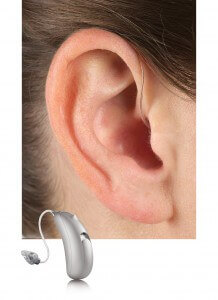
The Open-Fit BTE hearing aid sits snugly behind your eye. It’s connected to a speaker by a thin, hard-to-see wire.
With this hearing aid, the ear canal remains open, allowing sound to enter your ear more naturally. Its design also enables you to hear background noises easily while the main sounds, like voices, are fed into your hearing aid.
Open-Fit BTEs are ideal for people with mild, high-frequency hearing loss. An Open-Fit BTE hearing aid is also appropriate if you experience earwax buildup as it’s less likely to suffer damage from the wax.
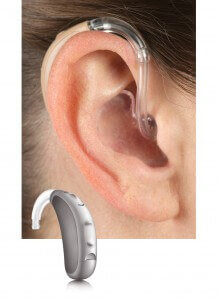
Behind-The-Ear hearing aids are the largest type of hearing aids. They are also both reliable and durable.
They hook over the top of the ear and nestle behind it. A narrow tube connects the main body of the hearing aid to an earmold that fits inside your ear canal.
People with a wide range of hearing loss can benefit from using a BTE hearing aid. They’re comfortable to wear and don’t come into contact with the ear canal, which some people find uncomfortable.
The internal components of a BTE device are more distanced from each other, making feedback less of a challenge for you.
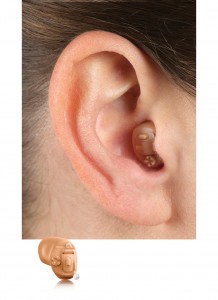
In-The-Canal hearing aids provide a secure fit because they’re custom-made to sit in the lower part of your outer ear bowl. ITC hearing aids have dual microphones, making it easier to hear even in noisy places.
Their large size reduces feedback and the chances of them becoming loose while eating or talking. ITCs are an excellent choice if you have mild to severe hearing loss.
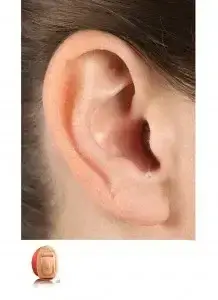
Invisible-In-The-Canal hearing aids are one of the most discrete types available. The hearing aids are customized to fit the shape of your ear.
They sit deep enough in the ear canal to prevent being seen from the outside. One significant advantage of their deep position is that IICs pick up less noise from the wind.
These devices produce a very natural and clear sound. This is because their small size doesn’t block the rest of your ear’s normal functions. If you’re concerned about the cosmetic appearance of your hearing aid and have mild hearing loss, an IIC hearing aid can be a great option.
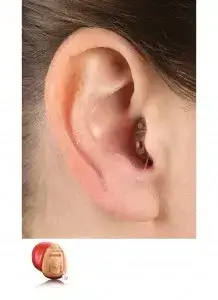
Tiny and compact, Completely-In-The-Canal hearing aids are among the smallest hearing aids available. The body of a CIC fits entirely inside your ear canal.
Its outer shell comes in various colors to blend with several skin tones, making it almost invisible. Best of all, CICs offer a superior sound experience for people with mild to moderate hearing loss.
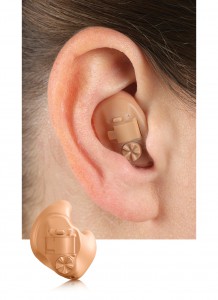
In-The-Ear hearing aids are worn in your ear bowl or concha and ear canal. They don’t have external tubes or wires.
With nothing behind the ears, this gives them a neat and clean look. The hearing aid is custom-molded to your ear for clear sound quality.
ITE hearing aids are the easiest to place in your ear and remove. They’re suitable if you have mild to severe hearing loss.
Hearing aids are generally durable and don’t need much upkeep. Still, taking care of them ensures they maintain peak performance for a long time without regular repairs. Here are some of the ways you can care for your hearing aids.
Store your hearing aids out of reach of children and pets. Storing them in a safe place will prevent hair, dander, dirt, and other debris from adhering to the surface of your hearing aid, which could damage your sensitive ear canal when inserting or removing them.
Wash your hands before handling your hearing aids. The microphone is very tiny and can be easily blocked by dirt.
Hearing aids are typically water-resistant. Nonetheless, too much water or moisture can lead to severe or permanent damage to the electronic components.
Take them out in the shower, bathtub, sauna, hot tub, and swimming pool. If your hearing aid becomes wet, use a soft towel to dry it gently.
Never use a hairdryer as the heat could destroy the delicate parts or prevent your device from working correctly.

Since hearing loss is often quite gradual, you might not notice if your hearing is not as good as before. Here are some of the signs that you may need hearing aids:
If you notice these signs frequently, you might have hearing loss. Only an audiologist or a hearing care specialist can determine if you need hearing aids.

Do you think you have a problem with your hearing? Visiting Specialty Care Institute is the first step toward finding a solution.
The top audiologists at The Hearing Institute at Specialty Care Institute will assess your hearing, explain any issues they discover, and recommend the next step. If you need a hearing aid, they’ll help you choose the best one for your needs.
Learn more about the best hearing aids for you by scheduling an appointment at Specialty Care Institute in Arlington Heights, Barrington, Hoffman Estates, or Elgin, IL, today!